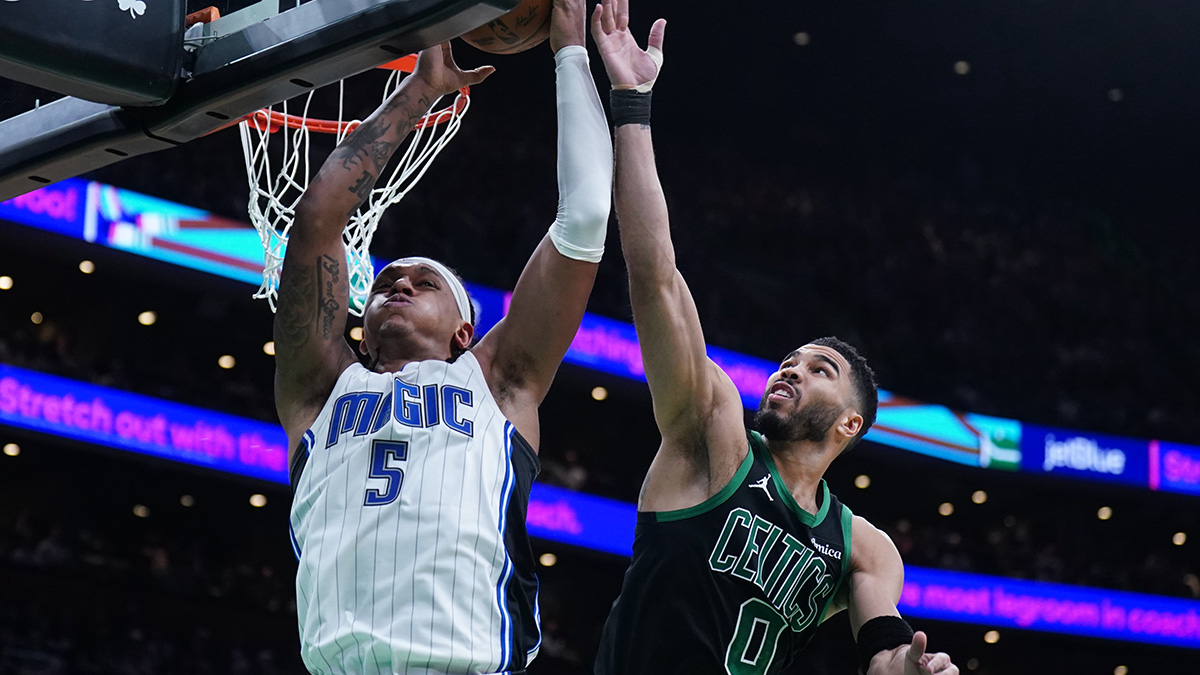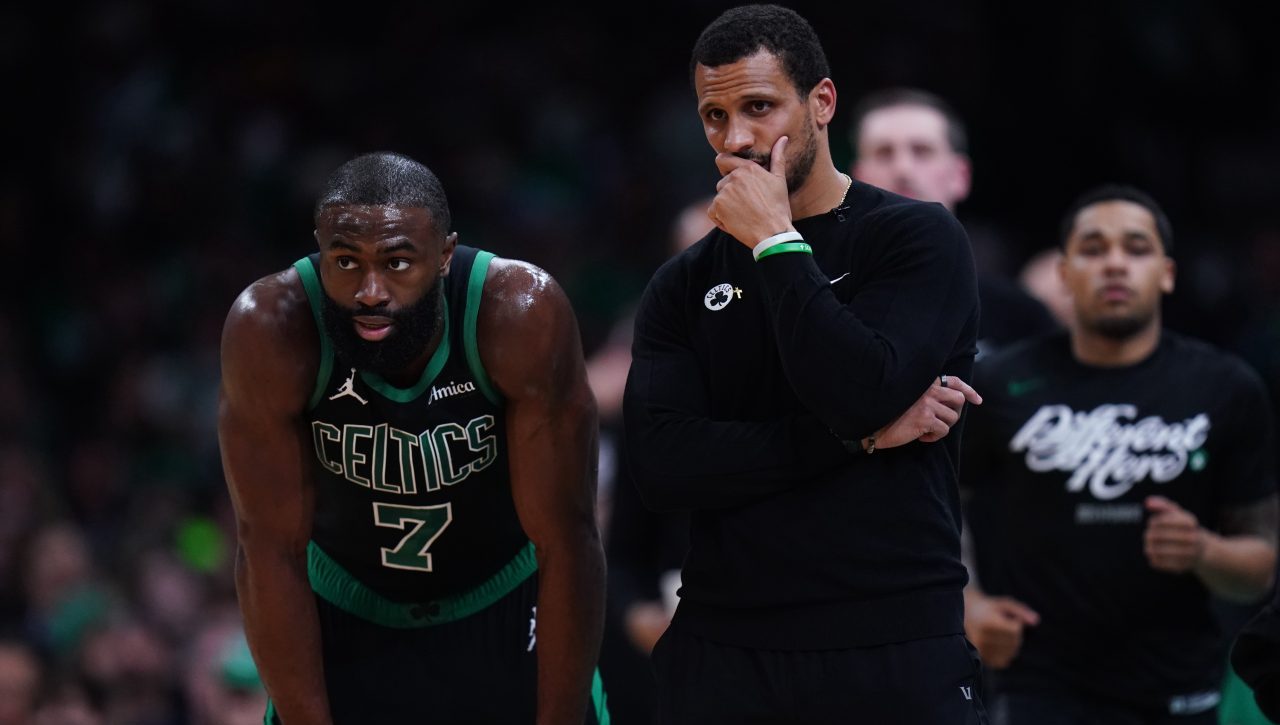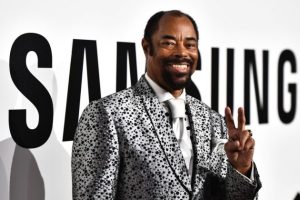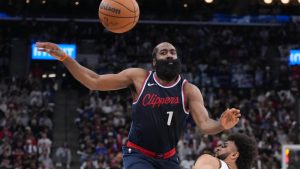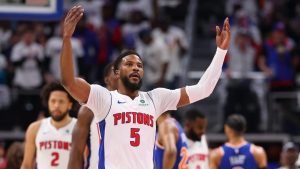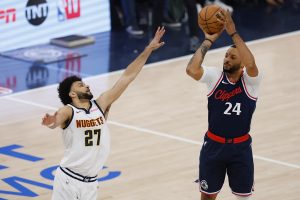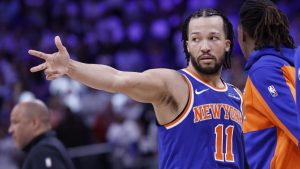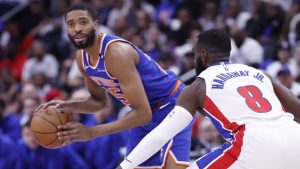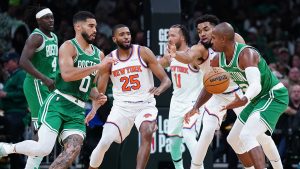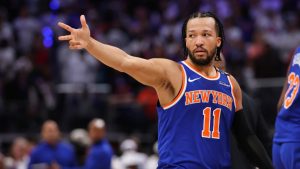‘Angry Tatum’ arrives: What we learned from Celtics-Magic series originally appeared on NBC Sports Boston
The Boston Celtics didn’t play with their food and eliminated the Orlando Magic in five games. They were rewarded with five full days of rest before their Eastern Conference semifinal series launches Monday night.
The extra time allows the Celtics to kick back while the Knicks and Pistons slug it out to see who will be on the other side of that Round 2 matchup. The Celtics get ample time to rest bumps and bruises, and can sit comfortably on their sofas watching the rest of the playoff action (like the rival Lakers getting bounced in Round 1 on Wednesday night).
While we await Boston’s Round 2 opponent, let’s take a look back at Round 1, and four of the biggest things we learned from the Celtics’ gentleman’s sweep of the frisky and physical Magic:
1. Angry Tatum is a bad man
Kentavious Caldwell-Pope seemingly woke a sleeping beast with his hard foul that severely bruised Jayson Tatum’s wrist in Game 1. Seething after missing Game 2, Tatum became the only Celtics player not named Larry Bird to score 35+ points in three straight playoff games.
Tatum set up a residency at the free throw line, connecting on 37 straight free throws to close out the series, all while making double-digit freebies in each of the final three games.
Tatum’s averages over those last three games: 36 points, 10.3 rebounds, 5.7 assists and 1.7 steals over 38.6 minutes per game. He shot 47.6 percent from the floor and 44 percent beyond the 3-point arc. The Celtics were +42 in his 116 minutes.
Tatum even debuted a new celebration at the suggestion of rookie Baylor Scheierman, in which he clasped that injured wrist right with his left hand with arms extended over head after 3-point makes. The suggestion is seemingly that, even with their flagrant ways, the Magic couldn’t hurt Tatum. In fact, the injury only seemed to make him stronger.
Despite Tatum’s strong overall postseason play throughout his career, the knock has always been a dip in efficiency. In 39 games between the 2023 and 2024 postseasons, Tatum shot just 44.3 percent from the floor and 30.5 percent beyond the 3-point arc.
If Tatum is the offensive wrecking ball we saw in Games 3, 4, and 5 against Orlando, good luck stopping the Celtics in their quest to repeat.
Tatum’s on/off differential in Round 1 was a team-best +21.6. The Celtics outscored opponents by 21 points per 100 possessions in his 156 minutes on the court. Tatum clearly fueled Boston’s offense, but the Celtics’ defensive rating was 23.4 points per 100 possessions better with him on the court than off (a team-best 95.3 during his on-court minutes).
Pundits have wanted Tatum to play with an edge throughout his career, and the injury in Game 1 sure seemed to give Tatum an extra bit of motivation while shredding whatever defense the Magic threw at him.
Tatum also admitted to playing a bit more “carefree” so far this postseason, having won a championship that took any extra weight off his shoulders.
2. Call him Al D. Sure!
… Because 38-year-old Al Horford is bringing elite defense “Nite and Day.”
Horford limited the Magic to 25-of-75 shooting (33.3 percent) in Round 1. That’s 11.4 percent below expected output, per NBA tracking. Both marks led the Celtics’ regulars in the series.
Franz Wagner generated just 10 points on 4-of-22 shooting with three blocked shots when defended by Horford in the series. In Game 4, Horford held Wagner and teammate Paolo Banchero to seven points on 3-of-15 shooting overall.
He swatted five shots that night, becoming only the second player aged 38 or older to accomplish that feat. (The other: Kareem Abdul-Jabbar).
Among the 118 players with more than 25 shots defended in Round 1, Horford currently ranks second in the playoffs in defensive field goal percentage, trailing only the Clippers’ Kawhi Leonard (31.5 percent).
Just a couple months shy of his 39th birthday, Horford continues to elevate his play when the games matter most. Injuries to teammates had him starting four of the five games against Orlando, while his minutes have already spiked from the regular season.
Horford is vital to whatever comes next. He was Boston’s best defender against Karl-Anthony Towns if the Knicks advance, and both the Cavaliers and Pacers have talented frontcourts that will stress teams on both ends of the floor.
3. The Celtics can win without the 3
The Celtics set an NBA record for 3-pointers with 1,457 makes during the regular season. They hoisted a staggering 48.2 attempts per game and put teams in a math bind with their “3 is greater than 2” strategy.
Pundits breathlessly wondered how Boston would win if it didn’t make 3-pointers in the playoffs. Then the Celtics drew the Magic, the best team in the league at taking away the 3, and showed they could diversify.
The Celtics averaged just 11.8 3-point makes on 31.2 attempts per game in Round 1 (down from 17.8 and 48.2 in the regular season). That essentially forced Boston to make up 18 points of production in alternate ways, which the team did, including with a noticeable uptick in scoring at the free throw line.
Orlando’s anemic offense certainly helped mask the Celtics’ lack of 3-point makes, but the C’s were forced to find other ways to generate their own points. More encouraging is that it feels like the floodgates could open if future opponents aren’t able to take away that shot to the level the Magic did.
It didn’t help that Kristaps Porzingis battled a “janky” shot while shooting 11.8 percent beyond the 3-point arc in Round 1. Even the ever-steady Derrick White dipped to 35.9 percent from 3-point range.
Getting those guys back to their regular-season levels is important moving forward. But the shot quality almost has to spike after the Magic did everything in their power to run the Celtics off the line for much of the series.
4. Health is vital in quest to repeat
For the second straight season, the Celtics just keep chugging whenever injuries leave them shorthanded. Boston lost Tatum for Game 2 and watched Jaylen Brown turn in a gem to open a 2-0 series lead.
Jrue Holiday missed three games with a hamstring injury, and the Celtics tripped up just once. And all this comes one year after Porzingis appeared in just seven of Boston’s 19 playoff games.
And yet, Round 1 was a reminder of how vital health can be. The Celtics are blessed with depth, but there’s a noticeable impact when you don’t have Holiday and his defensive versatility available. The margin for error gets slimmer when Brown’s knee ailment leaves him at something less than 100 percent on a given night.
The Celtics are fortunate to have quality depth. Even in a series in which he struggled to have a consistent offensive impact, Sam Hauser finished with a team-best on-court rating of +26.9. Payton Pritchard had a couple quiet offensive games on the road but played inspired defense throughout and had a +20.4 net rating in 134 minutes of court time.
It’s still jarring that only one Celtics lineup played more than 18 minutes together in Round 1. The double-big starting group of Horford, Porzingis, Brown, Tatum, and White logged 39 minutes over four games but had a minus-13.9 net rating in that span. Another double-big lineup with Kornet in place of Porzingis got the second-most minutes (18 over three appearances) and had a minus-21.5 net rating.
The Celtics otherwise cobbled it together throughout Round 1 and still found a way to win four of five games. On the positive side: The preferred starting five with Holiday in the mix had a +44.4 net rating in a small 13-minute sample. That’s still encouraging after that group struggled to find its footing at times during the regular season.
The Magic were feisty. Bigger challenges are almost certainly on their way. The Celtics need all their horses to navigate whatever is ahead.

‘Angry Tatum’ arrives: What we learned from Celtics-Magic series
Jayson Tatum has taken his game — and his demeanor — to a different level.
The Boston Celtics didn’t play with their food and eliminated the Orlando Magic in five games. They were rewarded with five full days of rest before their Eastern Conference semifinal series launches Monday night.
The extra time allows the Celtics to kick back while the Knicks and Pistons slug it out to see who will be on the other side of that Round 2 matchup. The Celtics get ample time to rest bumps and bruises, and can sit comfortably on their sofas watching the rest of the playoff action (like the rival Lakers getting bounced in Round 1 on Wednesday night).
While we await Boston’s Round 2 opponent, let’s take a look back at Round 1, and four of the biggest things we learned from the Celtics’ gentleman’s sweep of the frisky and physical Magic:
1. Angry Tatum is a bad man
Kentavious Caldwell-Pope seemingly woke a sleeping beast with his hard foul that severely bruised Jayson Tatum’s wrist in Game 1. Seething after missing Game 2, Tatum became the only Celtics player not named Larry Bird to score 35+ points in three straight playoff games.
Tatum set up a residency at the free throw line, connecting on 37 straight free throws to close out the series, all while making double-digit freebies in each of the final three games.
Tatum’s averages over those last three games: 36 points, 10.3 rebounds, 5.7 assists and 1.7 steals over 38.6 minutes per game. He shot 47.6 percent from the floor and 44 percent beyond the 3-point arc. The Celtics were +42 in his 116 minutes.
Tatum even debuted a new celebration at the suggestion of rookie Baylor Scheierman, in which he clasped that injured wrist right with his left hand with arms extended over head after 3-point makes. The suggestion is seemingly that, even with their flagrant ways, the Magic couldn’t hurt Tatum. In fact, the injury only seemed to make him stronger.
Despite Tatum’s strong overall postseason play throughout his career, the knock has always been a dip in efficiency. In 39 games between the 2023 and 2024 postseasons, Tatum shot just 44.3 percent from the floor and 30.5 percent beyond the 3-point arc.
If Tatum is the offensive wrecking ball we saw in Games 3, 4, and 5 against Orlando, good luck stopping the Celtics in their quest to repeat.
Tatum’s on/off differential in Round 1 was a team-best +21.6. The Celtics outscored opponents by 21 points per 100 possessions in his 156 minutes on the court. Tatum clearly fueled Boston’s offense, but the Celtics’ defensive rating was 23.4 points per 100 possessions better with him on the court than off (a team-best 95.3 during his on-court minutes).
Pundits have wanted Tatum to play with an edge throughout his career, and the injury in Game 1 sure seemed to give Tatum an extra bit of motivation while shredding whatever defense the Magic threw at him.
Tatum also admitted to playing a bit more “carefree” so far this postseason, having won a championship that took any extra weight off his shoulders.
2. Call him Al D. Sure!
… Because 38-year-old Al Horford is bringing elite defense “Nite and Day.”
Horford limited the Magic to 25-of-75 shooting (33.3 percent) in Round 1. That’s 11.4 percent below expected output, per NBA tracking. Both marks led the Celtics’ regulars in the series.
Franz Wagner generated just 10 points on 4-of-22 shooting with three blocked shots when defended by Horford in the series. In Game 4, Horford held Wagner and teammate Paolo Banchero to seven points on 3-of-15 shooting overall.
He swatted five shots that night, becoming only the second player aged 38 or older to accomplish that feat. (The other: Kareem Abdul-Jabbar).
Among the 118 players with more than 25 shots defended in Round 1, Horford currently ranks second in the playoffs in defensive field goal percentage, trailing only the Clippers’ Kawhi Leonard (31.5 percent).
Just a couple months shy of his 39th birthday, Horford continues to elevate his play when the games matter most. Injuries to teammates had him starting four of the five games against Orlando, while his minutes have already spiked from the regular season.
Horford is vital to whatever comes next. He was Boston’s best defender against Karl-Anthony Towns if the Knicks advance, and both the Cavaliers and Pacers have talented frontcourts that will stress teams on both ends of the floor.
3. The Celtics can win without the 3
The Celtics set an NBA record for 3-pointers with 1,457 makes during the regular season. They hoisted a staggering 48.2 attempts per game and put teams in a math bind with their “3 is greater than 2” strategy.
Pundits breathlessly wondered how Boston would win if it didn’t make 3-pointers in the playoffs. Then the Celtics drew the Magic, the best team in the league at taking away the 3, and showed they could diversify.
The Celtics averaged just 11.8 3-point makes on 31.2 attempts per game in Round 1 (down from 17.8 and 48.2 in the regular season). That essentially forced Boston to make up 18 points of production in alternate ways, which the team did, including with a noticeable uptick in scoring at the free throw line.
Orlando’s anemic offense certainly helped mask the Celtics’ lack of 3-point makes, but the C’s were forced to find other ways to generate their own points. More encouraging is that it feels like the floodgates could open if future opponents aren’t able to take away that shot to the level the Magic did.
It didn’t help that Kristaps Porzingis battled a “janky” shot while shooting 11.8 percent beyond the 3-point arc in Round 1. Even the ever-steady Derrick White dipped to 35.9 percent from 3-point range.
Getting those guys back to their regular-season levels is important moving forward. But the shot quality almost has to spike after the Magic did everything in their power to run the Celtics off the line for much of the series.
MORE CELTICS COVERAGE
4. Health is vital in quest to repeat
For the second straight season, the Celtics just keep chugging whenever injuries leave them shorthanded. Boston lost Tatum for Game 2 and watched Jaylen Brown turn in a gem to open a 2-0 series lead.
Jrue Holiday missed three games with a hamstring injury, and the Celtics tripped up just once. And all this comes one year after Porzingis appeared in just seven of Boston’s 19 playoff games.
And yet, Round 1 was a reminder of how vital health can be. The Celtics are blessed with depth, but there’s a noticeable impact when you don’t have Holiday and his defensive versatility available. The margin for error gets slimmer when Brown’s knee ailment leaves him at something less than 100 percent on a given night.
The Celtics are fortunate to have quality depth. Even in a series in which he struggled to have a consistent offensive impact, Sam Hauser finished with a team-best on-court rating of +26.9. Payton Pritchard had a couple quiet offensive games on the road but played inspired defense throughout and had a +20.4 net rating in 134 minutes of court time.
It’s still jarring that only one Celtics lineup played more than 18 minutes together in Round 1. The double-big starting group of Horford, Porzingis, Brown, Tatum, and White logged 39 minutes over four games but had a minus-13.9 net rating in that span. Another double-big lineup with Kornet in place of Porzingis got the second-most minutes (18 over three appearances) and had a minus-21.5 net rating.
The Celtics otherwise cobbled it together throughout Round 1 and still found a way to win four of five games. On the positive side: The preferred starting five with Holiday in the mix had a +44.4 net rating in a small 13-minute sample. That’s still encouraging after that group struggled to find its footing at times during the regular season.
The Magic were feisty. Bigger challenges are almost certainly on their way. The Celtics need all their horses to navigate whatever is ahead.

This article tagged under:
Chris ForsbergBoston CelticsJayson TatumAl HorfordOrlando Magic



